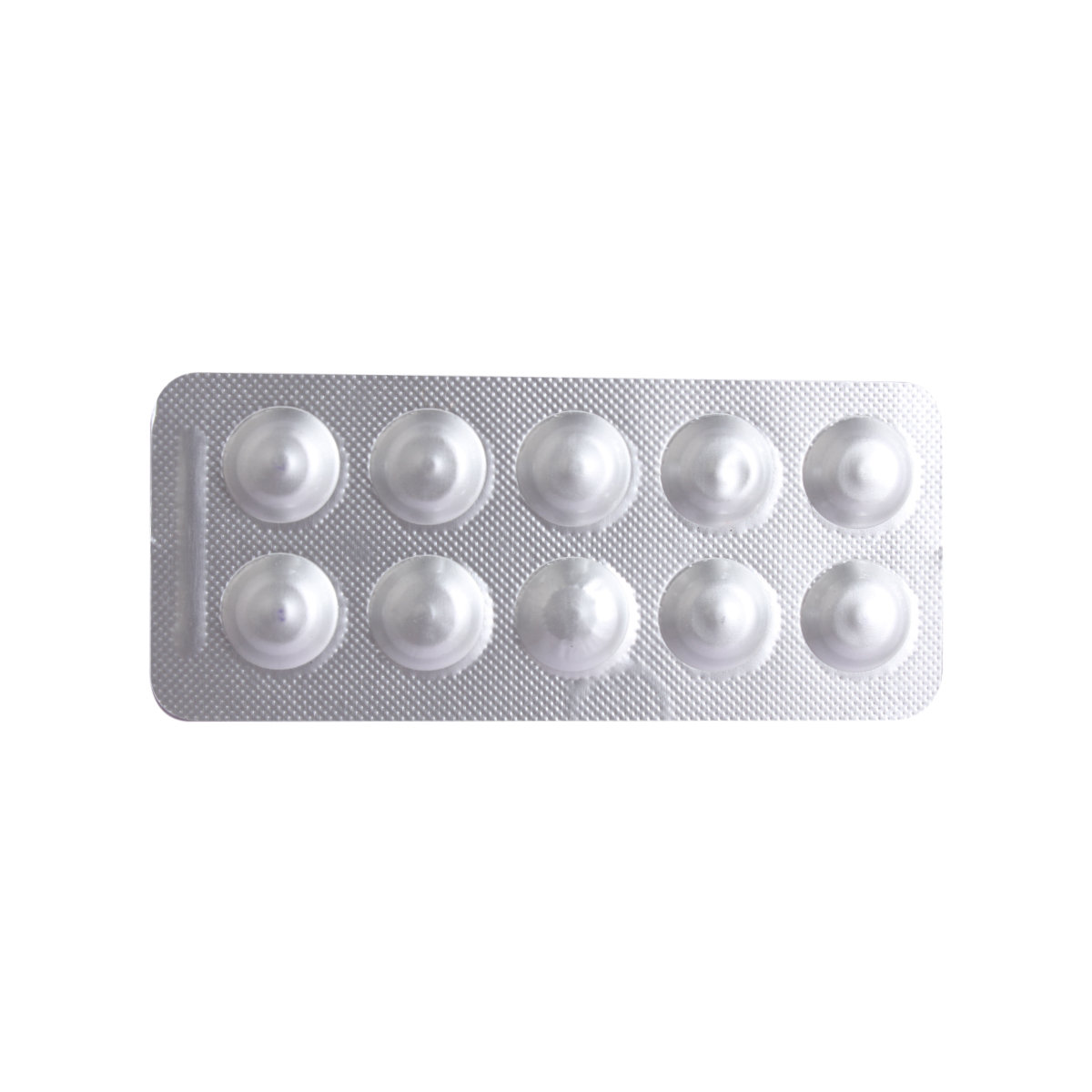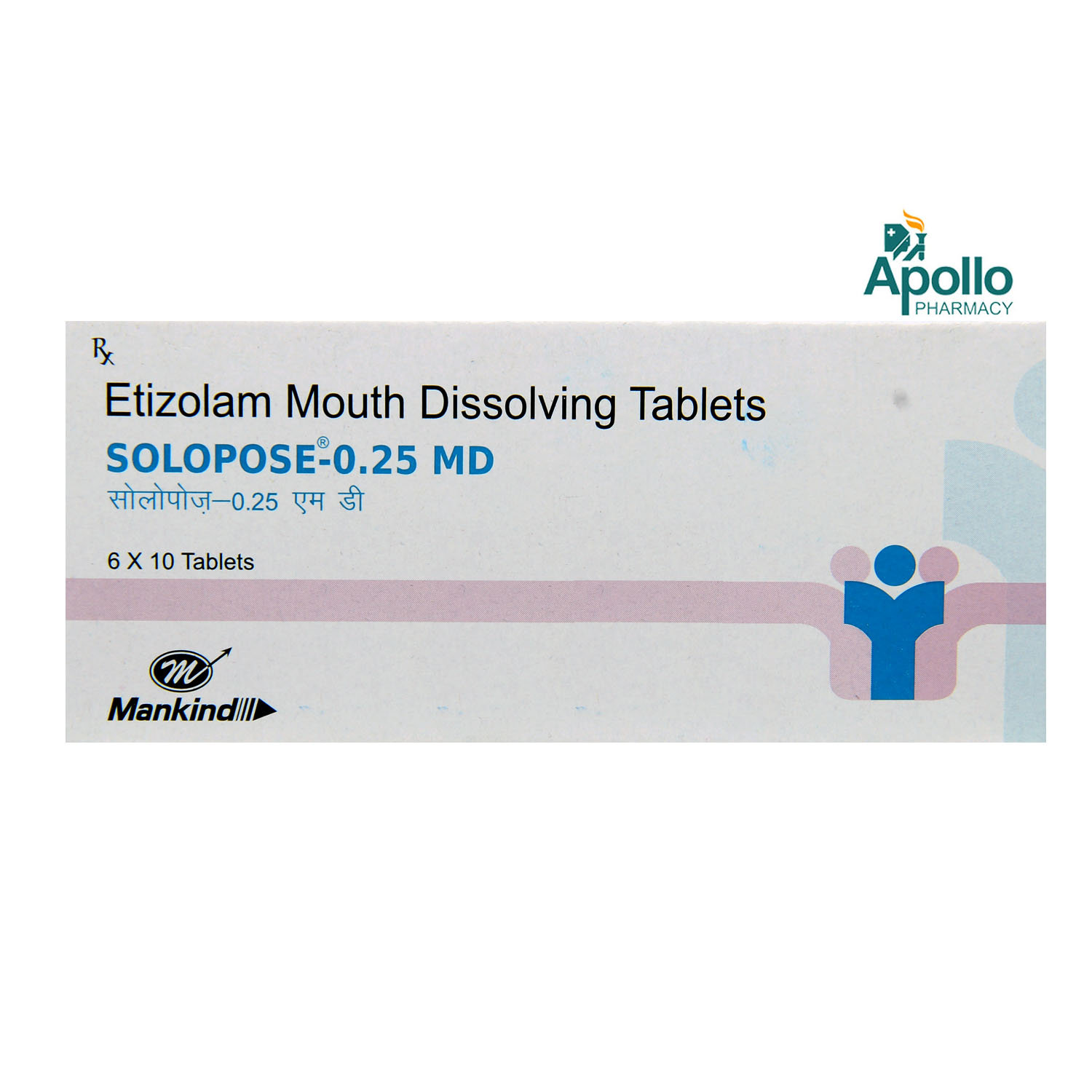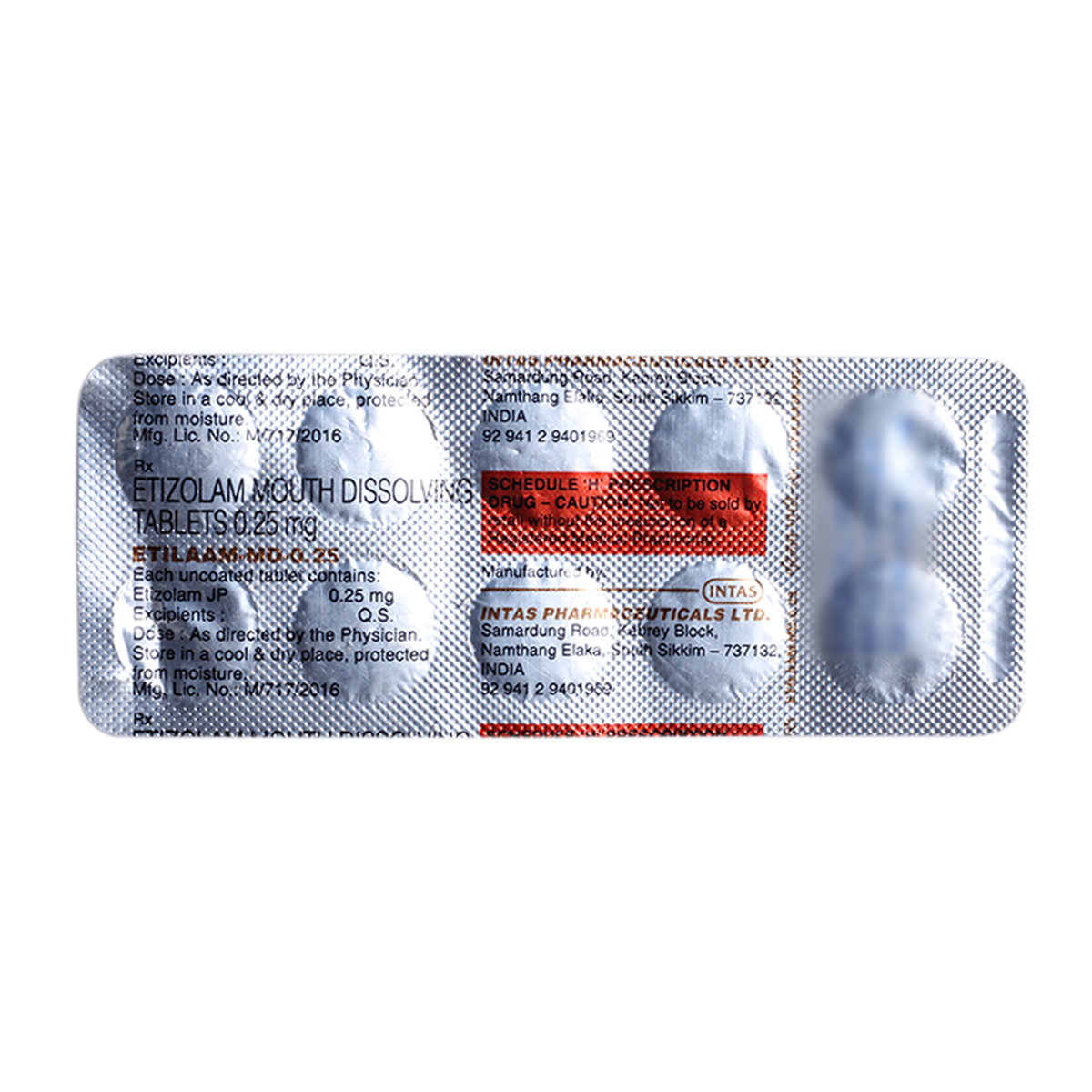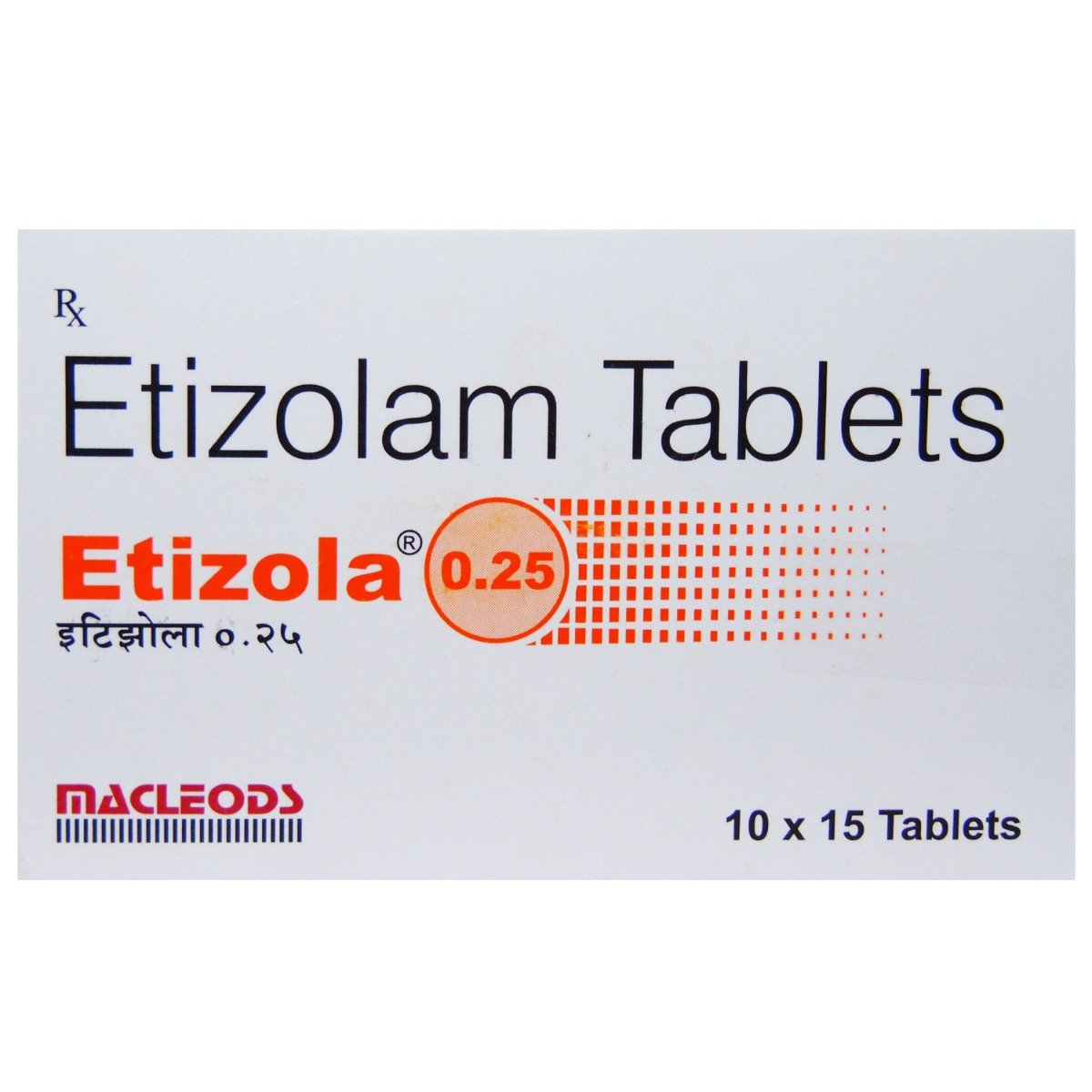EZOLENT 0.25MG TABLET
MRP ₹42
(Inclusive of all Taxes)
₹6.3 Cashback (15%)
Provide Delivery Location
Online payment accepted
 Prescription drug
Prescription drugWhats That
Composition :
Manufacturer/Marketer :
Consume Type :
Expires on or after :
Return Policy :
About EZOLENT 0.25MG TABLET
EZOLENT 0.25MG TABLET belongs to a class of 'anxiolytic' (anxiety reducer) called benzodiazepine primarily used in the treatment of anxiety disorder, panic disorder and insomnia (difficulty in falling or staying asleep). Anxiety is a mental health disorder associated with fear, worry and excessive nervousness. Insomnia is a disorder of sleep that causes difficulty in falling asleep or staying asleep. Panic disorder is a type of anxiety disorder that causes sudden feelings of fear even when there is no real danger with symptoms like a fast heartbeat.
EZOLENT 0.25MG TABLET reduces anxiety/panic, induces sleep and relaxes muscles due to fits episodes. It works by increasing the activity of GABA (a chemical messenger in the brain that acts as a natural nerve-calming agent) and is involved in inducing sleep. Thereby, EZOLENT 0.25MG TABLET relaxes muscles, reduces anxiety and helps to fall asleep.
Take EZOLENT 0.25MG TABLET as prescribed. Your doctor will advise how often you take EZOLENT 0.25MG TABLET based on your medical condition. Most common side effects of EZOLENT 0.25MG TABLET include drowsiness, ataxia (neurological conditions which affect balance and coordination), dysarthria (difficulty speaking), nystagmus (involuntary eye movement) and blepharospasm (involuntary closure of eyelids). Most of these side effects of EZOLENT 0.25MG TABLET do not require medical attention and gradually resolve over time. However, if the side effects persist or worsen, please consult your doctor.
If you are known to be allergic to EZOLENT 0.25MG TABLET or any other medicines, please tell your doctor. If you are pregnant or breastfeeding, inform your doctor before taking EZOLENT 0.25MG TABLET. EZOLENT 0.25MG TABLET should be used with caution in elderly patients as there is an increased risk of adverse reactions such as dizziness, muscle weakness and drowsiness. Do not take EZOLENT 0.25MG TABLET with opioids as it may cause breathing problems or other severe adverse effects. Respiratory depressant effects of EZOLENT 0.25MG TABLET are life-threatening in patients with severe chronic obstructive airways disease (COPD) and asthma. Overdose may lead to rhabdomyolysis (the breakdown of muscle tissue) and hypothermia (a dangerous drop in body temperature). Alcohol consumption with EZOLENT 0.25MG TABLET may potentiate the toxic effect of the drug.
Uses of EZOLENT 0.25MG TABLET
Directions for Use
Key Benefits
EZOLENT 0.25MG TABLET is an anxiolytic drug (reduces anxiety) that is used to treat anxiety, panic disorder over a short period and insomnia (difficulty in falling or staying asleep). EZOLENT 0.25MG TABLET increases the activity of GABA (a chemical messenger in the brain that acts as a natural nerve-calming agent) and is involved in inducing sleep. Thereby, EZOLENT 0.25MG TABLET relaxes muscles, reduces anxiety and helps to fall asleep.
Storage
Drug Warnings
Do not take EZOLENT 0.25MG TABLET if you are pregnant or breastfeeding as it may cause adverse effects in the baby. EZOLENT 0.25MG TABLET should be used with caution in elderly patients as there is an increased risk of adverse reactions such as dizziness, muscle weakness and drowsiness. Inform your doctor if you have myasthenia gravis (muscle weakness), chronic pulmonary insufficiency, drug addiction, kidney or liver problems before taking EZOLENT 0.25MG TABLET. Do not take EZOLENT 0.25MG TABLET with opioids as it may cause breathing problems, drowsiness, coma and even death.
Drug-Drug Interactions
Drug-Drug Interactions
Login/Sign Up
Drug-Food Interactions
Drug-Food Interactions
Login/Sign Up
Diet & Lifestyle Advise
- Do regular exercise and maintain healthy body weight.
- Maintain a diet rich in fruits, vegetables and whole grains. Avoid fried foods, high-fat dairy products, pastries and processed foods as they may worsen anxiety.
- Follow a regular sleep pattern. Do not take a nap during day time.
- Avoid watching tv, using mobiles or laptops just before bedtime.
- Avoid consumption of alcohol as it may increase drowsiness.
Side Effects of EZOLENT 0.25MG TABLET
- Drowsiness
- Ataxia (neurological conditions which affect balance and coordination)
- Dysarthria (difficulty speaking)
- Nystagmus (involuntary eye movement)
- Blepharospasm (involuntary closure of eyelids)
Habit Forming
Therapeutic Class
All Substitutes & Brand Comparisons
RX
Not for online saleEzilam-0.25 Tablet 10's
Sbs Biotech
₹28
(₹2.52 per unit)
33% CHEAPERRX
Not for online saleEzo-0.25 Tablet 10's
Lia Life Sciences Pvt Ltd
₹33.5
(₹3.02 per unit)
20% CHEAPERRX
Out of StockNot for online saleEzorel 0.25 mg MD Tablet 10's
Carrel Pharmaceuticals Llp
₹34
(₹3.06 per unit)
19% CHEAPER
Author Details
We provide you with authentic, trustworthy and relevant information
Drug-Diseases Interactions
Drug-Diseases Interactions
Login/Sign Up
FAQs
Drug-Drug Interactions Checker List
- CLONIDINE
- MOXONIDINE
- MINOXIDIL
- CLONAZEPAM
- CARBAMAZEPINE
- PAROXETINE
- BUPROPION
- CODEINE
- ZOLPIDEM
- FLUCONAZOLE
- CIMETIDINE
- ESOMEPRAZOLE
- OMEPRAZOLE
- CLOZAPINE
- DISULFIRAM
- LOFEXIDINE
- HYDRALAZINE
- NITROPRUSSIDE
- FLUVOXAMINE
- TRAZODONE
- MORPHINE
- CISAPRIDE
- DIAZOXIDE
- PHENYTOIN
Special Advise
Do not take EZOLENT 0.25MG TABLET for a prolonged time as it may lead to mental or physical dependence on EZOLENT 0.25MG TABLET.
Disease/Condition Glossary
Anxiety: It is a mental health disorder associated with fear, worry and excessive nervousness that may interfere with one’s daily activities. The symptoms of anxiety include feeling more stress than required for that event and lack of ability to set aside restlessness and worry.
Insomnia: It is a disorder of sleep that causes difficulty in falling asleep or staying asleep. It may be acute (short-term) or chronic (long-term). Acute insomnia may last from one night to a few weeks and occurs due to stress or life changes. Chronic insomnia may last from more than 3 nights per week to more than 3 months. Insomnia is mostly caused due to depression, stress, anxiety, jet lag, shift work, uncomfortable beds, chronic illness, caffeine, nicotine or alcohol intake or due to certain medicines.

Have a query?
Alcohol
Safe if prescribed
Avoid consumption of alcohol with EZOLENT 0.25MG TABLET as it may increase the risk of drowsiness and other adverse effects.
Pregnancy
Consult your doctor
EZOLENT 0.25MG TABLET is a Category C pregnancy drug, and safety is unknown. Please consult your doctor if you are pregnant or planning for pregnancy.
Breast Feeding
Consult your doctor
It is unknown whether EZOLENT 0.25MG TABLET is excreted in human milk. Please consult a doctor before using EZOLENT 0.25MG TABLET while breastfeeding.
Driving
Safe if prescribed
EZOLENT 0.25MG TABLET may cause dizziness, double vision or drowsiness in some people. Therefore, avoid driving if you feel drowsy, dizzy or experience any vision problems after taking EZOLENT 0.25MG TABLET.
Liver
Consult your doctor
Take EZOLENT 0.25MG TABLET with caution, especially if you have a history of Liver diseases/conditions. The dose may be adjusted by your doctor as required.
Kidney
Consult your doctor
If you have any concerns regarding the use of EZOLENT 0.25MG TABLET in patients with kidney problems, please consult a doctor.
Children
Safe if prescribed
The safety of EZOLENT 0.25MG TABLET in children is unknown. Please consult a doctor.














